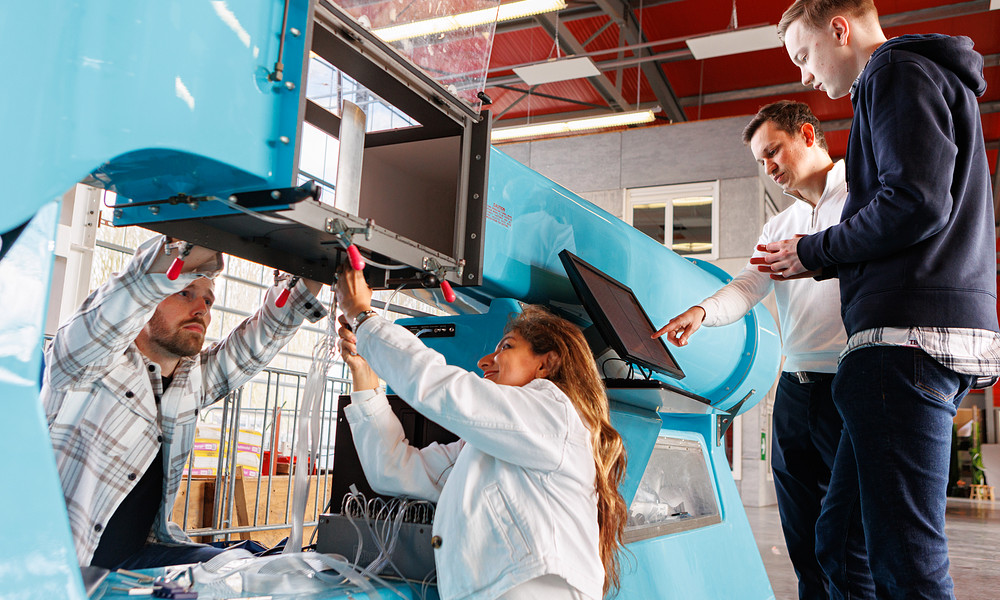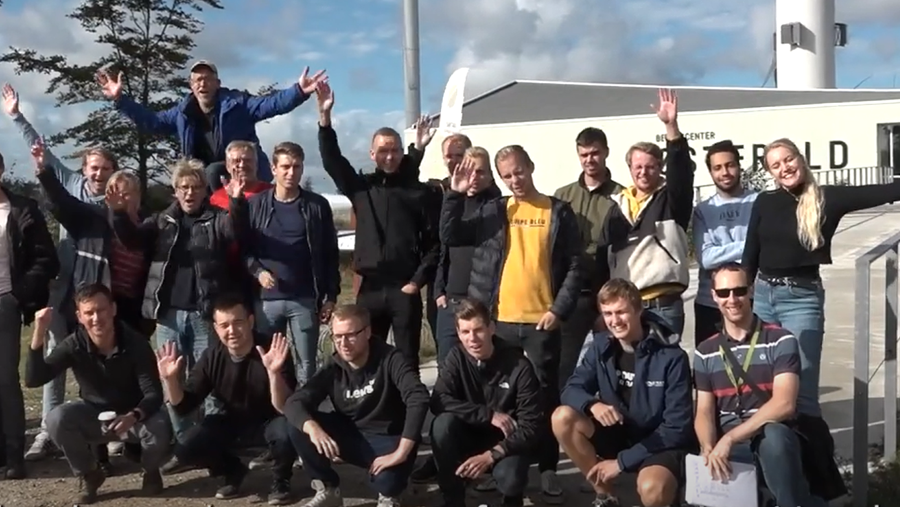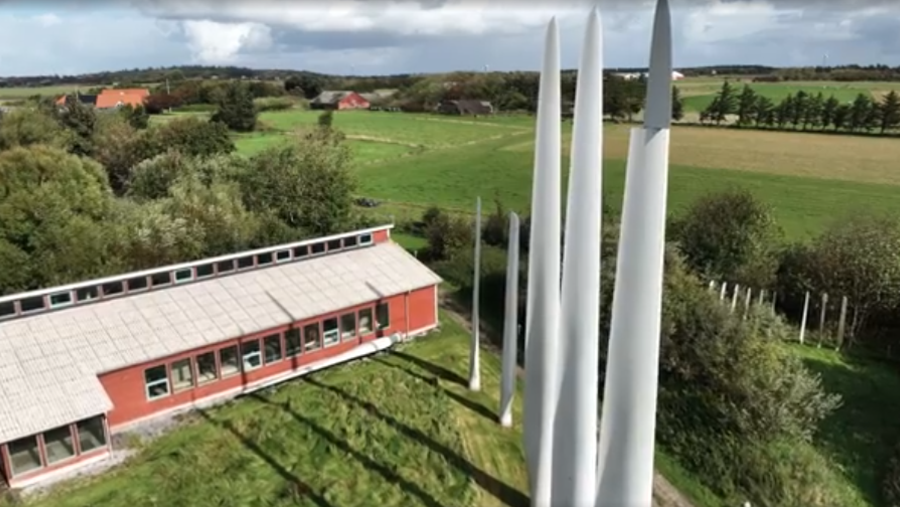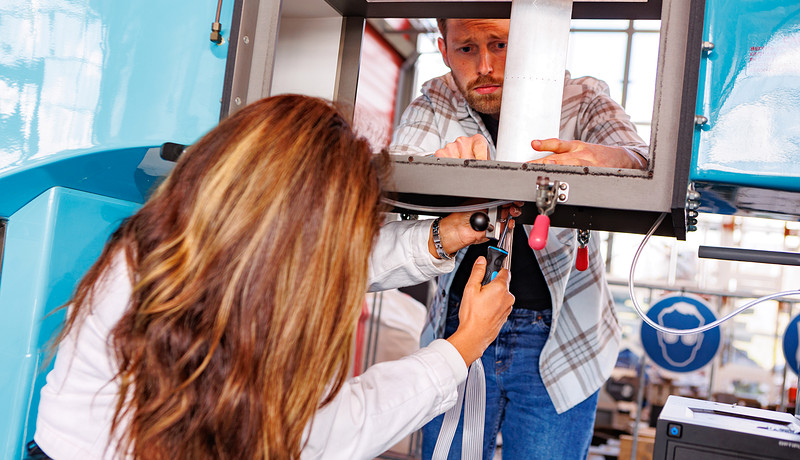Immerse yourself in on- and offshore wind energy!

Wind Energy meets Hydrogen
- Level
- Language
- English
- Credits
- 30 ECTS
- Startmonths
- Start: September
- Locations
- Groningen
Are you interested in sustainable energy, and in particular wind energy? Would you like to work on interesting projects with other students from various engineering disciplines? Would you like to learn everything about on- and offshore wind energy and join national and international excursions to small and large wind turbine manufacturers? This is your chance!
During this programme, you will deal with various themes that play a role in the offshore and onshore wind industry. For example; the design, construction, operation and maintenance of relatively small to very large wind turbines. You will learn about wind turbines with a horizontal and vertical axis, about the challenges surrounding electricity networks and how to deal with the varying energy yield of wind energy. We'll also take a side trip into hydrogen technology and look at how you can use hydrogen as a buffer alongside wind energy.
We introduce you to theory about turbine blade aerodynamics, the conversion to electricity, but also the challenges this poses to the electricity network. We will also bring you into contact with various large and small companies in the rapidly changing market in offshore and onshore wind energy. We are looking for ambitious students who want to roll up their sleeves and learn about renewable energy and wind turbines.

The Wind Energy programme has been developed in cooperation with Groningen Energy Transition Center (ENTRANCE), companies, and knowledge and research institutions. The programme is currently divided into 4 modules:
- Introduction Wind Energy. The principles of wind energy are dealt with in class. We will also work with various calculation tools (Solid Works, calculation models in Excel, etc.). During a practical session our small wind tunnel is used.
- Safety, Management and IO&M. In this module we go on a one week excursion to Denmark. We look at what safety aspects apply, for example, when installing and maintaining wind turbines, when performing work in workshops, and when using hydrogen. All participating students need to obtain their internationally recognized industrial safety certificate (VCA / SCC).
- Design and Realisation. Composites are an important component in the construction of wind turbine blades. This module is dedicated to the theory of composites and the testing of different homemade composite materials.
- Development, Implementation and Professionalisation. In this module you will work with a group of students on one or more projects. We have projects with partners from the wind turbine market, but students can also propose their own projects. In addition, this module includes the micro-wind turbine challenge, in which students build their own micro-wind turbine that is tested in our small wind tunnel. The student who can generate the most electrical power will be the winner of this challenge. We will also go on an excursion to one of the small wind turbine manufacturers near the city of Groningen.
| Introduction Wind Energy & Hydrogen | 5 ECTS |
| Safety, Management and IO&M | 5 ECTS |
| Design and Realisation | 5 ECTS |
| Development, Implementation and Professionalisation | 15 ECTS |
Take a look at the ECTS course catalogue for more information.
Please note that the schedule for this programme may vary from week to week. The programme is intensive and students who apply for this programme are expected to be available and present for the whole duration of the programme. Students are also expected to do the whole programme of 30 ECTS credits.
Extra costs
Costs of excursions: € 77 personal contribution for the week excursion to Denmark. Additional costs may apply for voluntary excursions. If you would like to do a SCC exam via the Hanze, you will need to finance this as well.

Before you can start
The programme is offered in the third year of a (4-year) bachelor programme. Students need to have completed 120 ECTS credits (4 semesters) at undergraduate level in the field of Engineering, Built Environment or Applied Sciences.
Admission & application
Please check with your home university whether there is an agreement set up with the Hanze School that is offering the exchange programme of your choice. To apply for and be admitted for our exchange programme you should take the following steps
-
1. Be nominated by your home university
Once you have been nominated, your nomination will be checked by us and confirmed to your home university by email. You will receive your application link during our application period.
-
2. Submit your online application
Once you have been nominated by your home university you will receive a personal application link and the application instructions during our application period. The application is fully digital and documents do not have to be send by email or postal mail. Make sure you do not miss our application deadline!
-
3. Letter of Acceptance
Once you have submitted your application we will check your documents. If you have to re-submit any documents, we will let you know. We will be sending out Acceptance Letters from the beginning of May when you start in September and from the middle of October when you start in February.
Find out more about our application process and practical matters.
Frequently Asked Questions
Contact
-

Arjen de Ruijter
Docent





